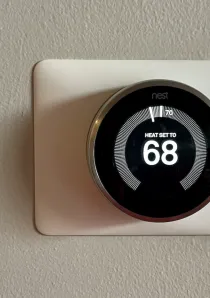Renters Guide To The Chicago Heat Ordinance
You get home, and you feel it instantly. It’s freezing outside. You call your friend and tell them the terrible news: "'There's no heat in my apartment!" This post runs down the steps that apartment renters in Chicago should take if you find yourselves in this unfortunate scenario by following the Chicago Heat Ordinance.
- Heating is an essential service in Chicago apartments
- How warm should your Chicago apartment be during winter?
- Who's responsible for providing heat in Chicago apartments?
- Do I need to pay extra for heating my apartment?
It Feels Cold In My Apartment -- Or Is It Just Me?
It’s one of the worst things that can happen while renting an apartment. Unlike air conditioning, having heat in your apartment or condo is one of the “essential services,” along with running or hot water, electricity, gas, or plumbing, listed in the City of Chicago’s Residential Landlord and Tenant Ordinance. This provision is typically called the Chicago Heat Ordinance. So what can you do, and what should you do? This depends on who’s responsible for paying for the heat, which should have been detailed in your Chicago lease agreement.
How Warm Should Your Chicago Apartment Be During Winter?
- The city of Chicago's Chicago Heat Ordinance has guidelines on apartment/apartment building temperatures.
- Chicago municipal code states that from September 15 - to June 1, landlords and building managers are responsible for maintaining these minimum temperatures in your apartment or apartment building: 68 degrees from 8:30 a.m. to 10:30 p.m. and 66 degrees all other times. If the temperatures are not being met, you can call 311 or contact the City of Chicago.
Who's Responsible for Making Sure the Heat Works in My Chicago Apartment?
- Contact your landlord right away. Often the problem can be solved with a phone call.
- You need to inform your landlord in writing and deliver it to the landlord’s address, and you can do one of the following…
- Contact the utility company (ComEd and/or People’s Gas), pay them to restore the service, keep the receipt and deduct the cost from your rent. Or you can get a space heater in the meantime, keep the receipt and deduct the cost from your rent.
- Move out and stay somewhere else until service is restored. You don’t have to pay rent during this time, and you can deduct the cost of the temporary housing from future rent payments as long as the cost doesn’t exceed your monthly rent.
- If it comes to this, you can sue your landlord. Contact an attorney and recover damages based on the reduced value of your apartment plus attorney’s fees.
- Request in writing that the landlord fixes the problem within 24 hours. If they don’t, you can withhold a cost from your rent that “reasonably reflects the reduced value of its premises,” which means an attorney would help in this case.
- In a written notice, request that the landlord fix the problem within 72 hours. If they fail to do so, you can terminate your lease. You must move out within 30 days if you do that, or the termination is considered withdrawn.
Do I Need to Pay for Extra Heat?
- The landlord is responsible for giving you a written statement that projects monthly costs for heating your unit when you rent a Chicago Apartment.
- Contact the utility company if you have further questions or need a heating cost estimate for your apartment.
Domu strongly encourages you to consult a lawyer if you have any questions about your particular leasing situation. Domu is not a law firm, and this webpage does not contain legal advice. While we endeavor to provide complete and accurate information, we make no warranties about the information included here.




